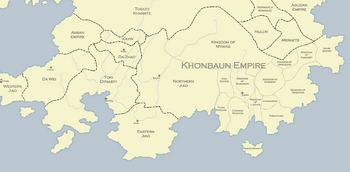User:Krugmar/Sandbox11: Difference between revisions
(Created page with "{{Infobox former country |native_name = 大焜 |conventional_long_name = Great Kun |common_name = <!-- Name to be used in constructing links and category...") |
No edit summary |
||
| Line 69: | Line 69: | ||
|symbol_type = <!-- Displayed text for link under symbol. Default "Coat of arms" --> | |symbol_type = <!-- Displayed text for link under symbol. Default "Coat of arms" --> | ||
|symbol_type_article = <!-- Link target under symbol image. Default: Coat of arms of {{{common_name}}} --> | |symbol_type_article = <!-- Link target under symbol image. Default: Coat of arms of {{{common_name}}} --> | ||
|image_map = | |image_map = KhonbaunEmpire.png | ||
|image_map_alt = | |image_map_alt = | ||
|image_map_caption = | |image_map_caption = Great Kun in 1665, within the [[Khaunban Empire]] | ||
|image_map2 = <!-- If second map is needed; does not appear by default --> | |image_map2 = <!-- If second map is needed; does not appear by default --> | ||
|image_map2_alt = | |image_map2_alt = | ||
| Line 154: | Line 154: | ||
==Etymology== | ==Etymology== | ||
- Kun comes from 焜, is phonetically similar to ''Khaun'' in Khaunban and has a similar meaning to Jiao indicating some form of continuity (Kun: (literary) bright, shining; Jiao: white, bright, brilliant, clear). Dynasty initially called Later Jiao from 1661 to 1663, and with Intharatcha inserting himself into the Liu family, having himself be adopted by the Taichu Emperor, who he forced to abdicate. | |||
昆 occasionally used, same pronunciation (Kūn), but has connotations of 'elder brother' and 'later', also reinforcing continuity. | |||
Revision as of 02:49, 4 March 2021
Great Kun 大焜 | |||||||||||
|---|---|---|---|---|---|---|---|---|---|---|---|
 Great Kun in 1665, within the Khaunban Empire | |||||||||||
| Capital | Rongzhuo (1661-1667) Sippom (1667-1682) | ||||||||||
| Common languages | Middle Kasi Middle Xiaodongese | ||||||||||
| Religion | Zohism | ||||||||||
| Government | Monarchy | ||||||||||
| Emperor | |||||||||||
• 1661-1673 | Intharatcha | ||||||||||
• 1673-1682 | Borommarachathirat | ||||||||||
• 1682-1685 | Kriang Krai | ||||||||||
| |||||||||||
| Today part of | Xiaodong Kuthina Siamat | ||||||||||
| |||||||||||
The Great Kun, (Xiaodongese: 大焜 ; fuhao: Dà Kūn), also known as the Kasi Kun, and initially as the Later Jiao (後皎 Hòu Jiǎo), was a Xiaodongese dynasty of Kasi origin which flourished during the tumultuous Transition from Jiao to Toki. It was founded by Intharatcha, founder of the Khaunban Empire, after he captured Rongzhuo from an ailing Jiao dynasty after its flight east due to the Red Orchid Rebellion. It caused a splintering between the Jiao princes, which allowed the ambitious Toki Sinzou to conquer much of Xiaodong for his nascent Toki dynasty. Rongzhuo was captured in 1667 by the Toki, and the dynasty was largely stagnant after Intharatcha's death in 1673, only holding on to minor territory in Xiaodong's east. The Toki would capture these lands in 1682 and sack Sippom, reducing the Khaunban Empire to a rump state centred around the city of Khaunban. The murder of its last emperor Kriang Krai in 1685 would see its claims forgotten and the dynasty become defunct.
- something about the dynasty having the potential to become the first conquest dynasty of Xiaodong. Jiao to Toki unique transition as it had three possible conquest dynasties: Gurkhan, Toki, and Khaunban. Talk further about divides between Jiao princes and Intharatcha, problems of maintaining Khaunban empire in east with Xiaodong invasion in west. Dynasty largely irrelevant after Intharatcha's death, only used for administration of Xiaodongese territories -
Etymology
- Kun comes from 焜, is phonetically similar to Khaun in Khaunban and has a similar meaning to Jiao indicating some form of continuity (Kun: (literary) bright, shining; Jiao: white, bright, brilliant, clear). Dynasty initially called Later Jiao from 1661 to 1663, and with Intharatcha inserting himself into the Liu family, having himself be adopted by the Taichu Emperor, who he forced to abdicate.
昆 occasionally used, same pronunciation (Kūn), but has connotations of 'elder brother' and 'later', also reinforcing continuity.